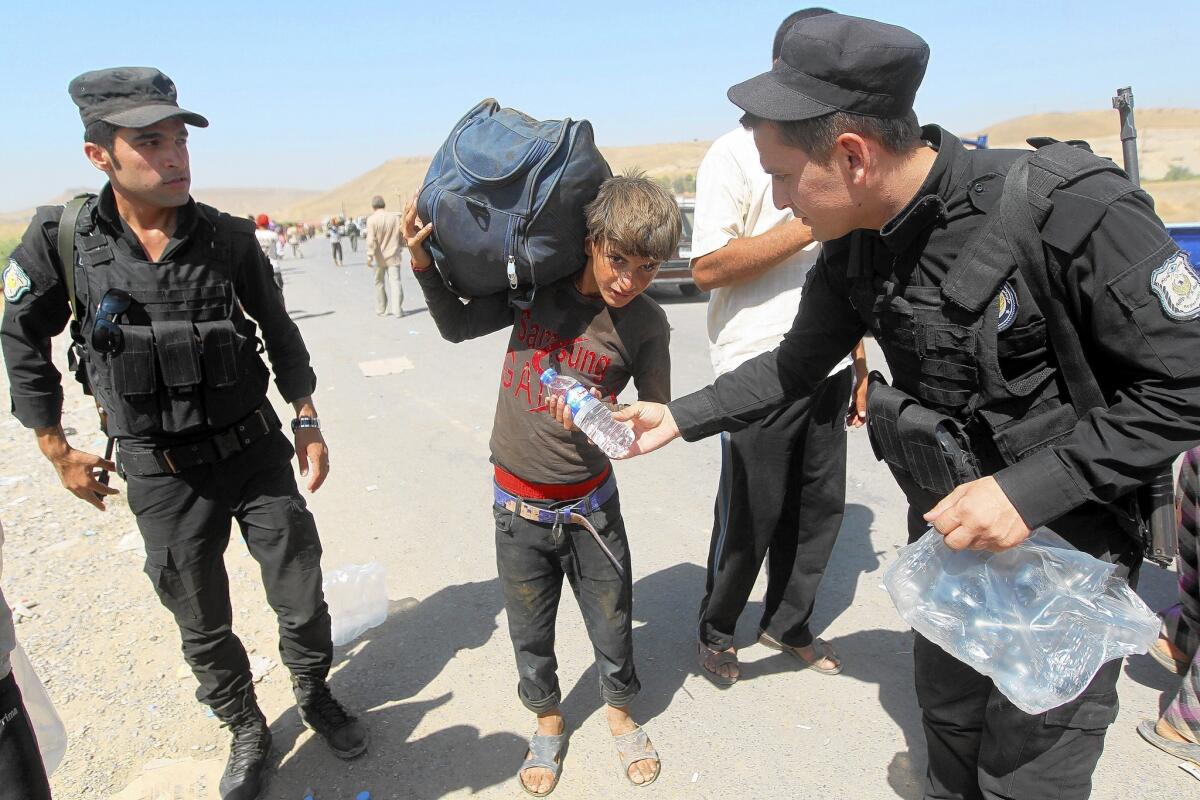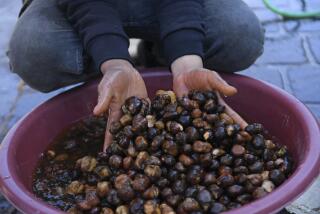Iraq militants pull back from two towns after Kurdish counterattack

The town was largely abandoned, except for laid-back groups of Kurdish troops, and there was little sign of combat — a few burned-out storefronts, scattered cartridges on the streets, the bullet-riddled body of an Islamic militant drawing flies next to a grain silo.
Makhmour, an agricultural and oil center about 35 miles southwest of Irbil, was as close as fighters of the Islamic State got to the capital of Iraqi Kurdistan before being driven off Sunday. The militants’ takeover last week of Makhmour and another Kurdish town, Gwer, caused a near-panic in prosperous, cosmopolitan Irbil. Their rapid advance also helped persuade the White House to begin airstrikes against the militants.
The militants, who Kurdish commanders say numbered several hundred in each town, pulled back after Kurdish forces mounted a counterattack. But they had delivered a message: No place was safe, not even the semiautonomous Kurdish region, protected by peshmerga forces renowned for their battlefield prowess.
Last week, the peshmerga beat a hasty retreat when confronted by the heavily armed, battle-tested militants, dismaying many Kurds.
“I was really surprised that the peshmerga didn’t stay and fight,” lamented one shopkeeper who returned Monday to remove inventory from his hardware store, clearly not convinced that this was the final chapter in the conflict.
Privately, some Kurdish commanders also expressed misgivings about the embarrassing withdrawal. They blamed orders from higher-ups.
On Monday, no one was guaranteeing that the militants wouldn’t try to storm back from safe havens beyond the current reach of Kurdish forces. The Islamic State fighters suffered relatively few casualties in the two towns and lost only a handful of vehicles, according to peshmerga officers. And they pulled back only to nearby areas where the Sunni Arab populations support them, Kurdish fighters said.
The motivation for seizing the two towns was unclear. Whereas many Kurds feared it was a precursor to an assault on Irbil, some Kurdish commanders speculated that it was the presence of oil and gas fields in the area that motivated the militants. The Islamic State is already said to be doing a prosperous black-market trade in oil from wells seized in Iraq and Syria.
The militants’ relatively quick retreat might indicate that the attacks were meant to test Kurdish defenses and gauge the possible international reaction.
“It’s safe here for now,” said Lt. Gen. Kheder Alwan, who was chatting with other officers in the sweltering Communist Party headquarters in Makhmour, usually home to about 12,000 people, almost all ethnic Kurds. “But we can’t be sure they won’t come back. They have good weapons and experienced fighters.”
Kurdish forces acknowledge that the militants are battle-tested, both in Iraq and Syria, and have superior weapons, many seized from Iraqi military stocks. The group recruits local Arab men and pays them well, the Kurds said.
The black-clad Islamic State forces rolled into the Kurdish zone in U.S.-made Humvees and pickups mounted with Dushkas, Soviet-era heavy machine guns that are militia favorites from Afghanistan to Libya. They decamped in the same fashion Sunday after several hours of firefights with Kurdish forces.
The Kurds here were generally armed with AK-47 assault rifles and small machine guns.
The militants’ now-notorious motorized columns barreling through flat desert terrain would seem to be relatively easy targets for U.S. warplanes and drones. It remains to be seen, however, whether U.S. aerial strikes will force the Islamic State to start acting more like a guerrilla force.
In both Makhmour and Gwer, most residents cleared out as word of the Islamic State advance spread Wednesday evening. By Monday, few had returned.
Kurdish troops and commanders interviewed were unanimous in their praise of the U.S. decision to bomb Islamic State positions, though no one knew with certainty what the Americans had hit.
“We heard some bombs; we don’t know if it was the Americans or Iraqi government” aircraft, said Col. Waria Awla, who headed a peshmerga contingent in the center of Makhmour, where gun battles raged for a few hours Sunday, leaving several shops charred. “But we need more — more heavy weapons, more airstrikes. We have plenty of manpower.”
It has become a common refrain among Kurdish commanders. After the collapse of Iraqi government forces in June in much of northern Iraq, they now face a more than 600-mile front against Islamic State and allied fighters.
The Kurds, longtime U.S. allies, have repeatedly asked for direct shipments of artillery, ammunition and other weaponry. The White House appears to be listening. On Monday, officials said the U.S. and allies were preparing to send antitank and other weapons to the Kurds. In the past, the U.S. would funnel aid to Kurdish troops only through the Iraqi government in Baghdad.
Although spirited warriors, the Kurdish troops appeared to be poorly organized and lightly armed. The peshmerga threw up earthen berms on the outskirts of Makhmour to slow down a new mechanized attack.
But a dozen young Kurdish troops gathered at a checkpoint on the edge of town didn’t appear especially aware of the military situation. Instead of keeping a lookout for infiltrators beyond their berms, the Kurds were huddled together in the shade, trying to stay out of the punishing sun.
Miles of nearby desert roads, dotted with oil wells and reminiscent of stretches of West Texas, lacked any noticeable military presence.
Arriving at the entrance to Gwer, after traversing 20 or so miles of eerily empty roads, a Kurdish commander advised journalists that it probably wasn’t wise to proceed into the center of town. Militants with heavy machine guns were ensconced in an Arab village just across a small river. The Islamic fighters had blown up the lone bridge, cutting off pursuit.
Perhaps the most formidable-appearing Kurdish contingent in Makhmour was the force of the Kurdistan Workers Party, or PKK, the guerrilla faction that has been fighting a 30-year war against the Turkish government.
The PKK has a camp just outside Makhmour, bedecked with images of its leader, Abdullah Ocalan, jailed for life in Turkey on terrorism charges. PKK fighters interviewed said they fought off the Islamic State’s efforts to storm their camp.
Down the road from the camp, black graffiti on the wall of a deserted housing complex declared, “The Islamic State is here to stay.” Someone had blotted out the words with spray paint.
More to Read
Start your day right
Sign up for Essential California for news, features and recommendations from the L.A. Times and beyond in your inbox six days a week.
You may occasionally receive promotional content from the Los Angeles Times.





